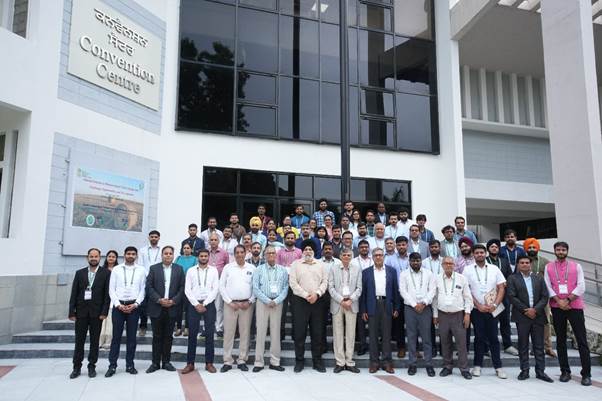A one-day “National Seminar on Biomass Supply Chain Management: Challenges, Opportunities, and Developments” has been organized at MGSIPA Complex in Chandigarh today, September 5, 2024, to understand and address the challenges and opportunities associated with the efficient management of biomass supply chains (BSC) in the country. The seminar has been organized by Sardar Swaran Singh National Institute of Bio-Energy Technology (SSS-NIBE), Kapurthala, an autonomous institution of the Ministry of New and Renewable Energy, Government of India. The seminar seeks to foster collaboration and knowledge exchange to facilitate the development of cost-effective and efficient biomass supply chains to support India’s transition to a circular bio-economy. It brought together government officials, industry representatives, entrepreneurs, policy makers and researchers to share insights, experiences, and best practices in biomass supply chain management. The seminar aims to highlight the need and particular relevance of efficient biomass supply chains for the success of bioenergy programs in the country.
The event was inaugurated by the Chief Guest and Mission Director, SAMARTH (Sustainable Agrarian Mission on use of Agri-Residue in Thermal Power Plants), Ministry of Power, Government of India, Shri Satish Upadhyay; Guest of Honour and Executive Director, Punjab State Council for Science & Technology (PSCST), Government of Punjab, Shri Pritpal Singh; and Director General, SSS-NIBE, Dr. G. Sridhar.
Director General, MGSIPA, Shri Anirudh Tewari, with his extensive experience in stubble management policies and practices, graced the event and shared his valuable insights with the participants.
“Need to view Biomass Supply Chain Management from Demand Side”
In his talk, the Chief Guest and Mission Director, SAMARTH, Shri Satish Upadhyay, highlighted that there is a need to view supply chain management from the demand-side and spoke on the importance of enhancing demand creation for the development of market-driven mechanisms for the offtake of biomass. He also mentioned that biomass utilisation has critical environmental and social benefits for our country. He informed the participants about the successful work being done by the SAMARTH Mission for biomass co-firing and how it is increasing utilisation of biomass in power generation.
“Need to use Modern Bioenergy Pathways to harness potential of Biomass”
Guest of Honour and Executive Director, PSCST, Shri Pritpal Singh highlighted that availability of space for storage of biomass, supply to industry and management of leakage are some challenges which need to be addressed. He stressed that we should collectively work on harnessing the potential of biomass, and on utilising it through modern bioenergy pathways, rather than wasting it. He said that there is a need to make biomass available at the minimum possible cost, so that it is economically viable for industry.
“Supply Chain Management is Critical for Success of Bioenergy Programmes”
Director General, SSS-NIBE, Dr. G. Sridhar highlighted the relevance and importance of biomass supply chains in the country. He also apprised the participants about the research SSS-NIBE is doing in the field of bio-energy, for advancement of the sector. He stressed how supply chain management is critical for the successful implementation of bioenergy programs in the country.
Mr Maganbir Singh from PSCST delivered a talk on paddy challenge in the state of Punjab. He highlighted the activities of PSCST, the current paddy utilisation pathways in Punjab, the challenges faced in its utilisation and opportunities available to use it as a resource.
The day-long seminar will have sessions exploring various facets of the challenges and opportunities associated with the efficient management of biomass supply chains in the country.

About SSS-NIBE
Sardar Swaran Singh National Institute of Bio-Energy (SSS-NIBE) is an autonomous institute of the Ministry of New and Renewable Energy (MNRE), Government of India. The Institute is an R&D Institute with a mandate to focus on Bio-energy and develop innovative technologies.
 Matribhumi Samachar English
Matribhumi Samachar English


